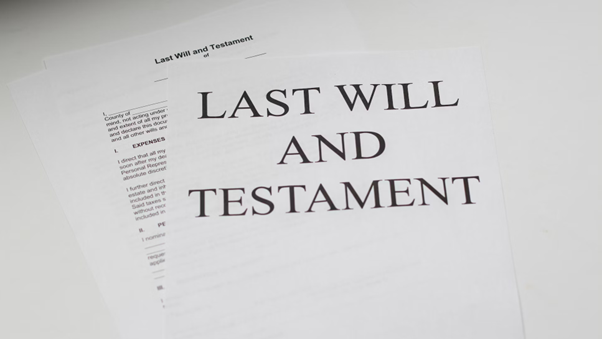Thinking about the future is essential, especially when it comes to protecting the interests of your loved ones. Creating a will is the best way to ensure your wishes are followed and your loved ones are taken care of when you’re gone. However, there are plenty of misconceptions about what should be included in a will…
Adding too much detail, or too many provisions, can actually complicate and delay the distribution of your estate. That’s why, whether you’re drafting a new will or reviewing an existing one, knowing what to leave out is just as important as knowing what to include.
To avoid these pitfalls, work with us at Anthony Joyce & Co Solicitors. We guide you through the complexities of estate planning, ensuring your will is not only comprehensive and legally enforceable but also truly reflects your wishes.
Here are eight things you should NEVER put in your will:
1. Property You Don’t Fully Own
Only include property that you fully own in your name in your will. This may seem obvious, but for most people, the most valuable asset they own is their the family home which they own with their spouse. In the vast majority of cases this co-owned property is held as a “joint tenancy” which means it passes to your surviving spouse on your death and is not distributed in accordance with your will. Mentioning it in your will could cause confusion and potentially undermine your spouse’s/co-owner’s rights.
2. Conditional Gifts
Never try to exert too much control from beyond the grave. Often your attempt to deal with hypothetical problems in your will, creates even more problems for your executors and beneficiaries in real life after your death because you have effectively tied their hands. Conditional gifts or gifts with limitations can be problematic and often render the gifts worthless. For instance leaving a house to one child with a right of residence in favour of another quite often means that the gift is effectively worthless to both children as the house cannot be sold if either party do not consent.
3. Forgiveness of Debts
Including the forgiveness of debts in your will is not effective. Legitimate debts owed to you can’t be cancelled just by stating it in your will because your estate has the right to collect these debts. This can lead to confusion and potential conflicts among your beneficiaries, as they might expect the debts to be forgiven as per the will’s instructions.
If you want to forgive a debt, it’s better to do so through proper legal channels while you’re alive.
4. Vague Beneficiary Descriptions
Be specific about who gets what and avoid vague descriptions of beneficiaries as this can lead to disputes and delays. Always use full legal names, contact details, and addresses. For example, saying “my friend John” could apply to multiple people. Clear descriptions help ensure your estate is distributed smoothly.
If you vaguely describe beneficiaries, the executor might need to consult with multiple people or seek a court’s decision to interpret the will, delaying the distribution of your estate and increasing legal costs.
5. Digital Assets and Passwords
Do not include sensitive information like digital account passwords in your will. Wills become public record once they go through probate, exposing your personal information and potentially opening the doors to fraud and identity theft. Instead, create a digital estate plan or a secure document listing your digital assets and passwords.
6. Life Insurance Proceeds
Life insurance proceeds should not be included in your will if there is a beneficiary nominated on the insurance policy. The reason being is the insurance company will follow the policy’s designated beneficiary, regardless of what your will says. So, including provisions for life insurance proceeds in your will can potentially delay the payout.
7. Executor or Trustee Without Consent
Executors are the persons you appoint to carry out your wishes under the will. Trustees are persons you appoint to look after and manage asset on behalf of beneficiaries, usually children or people with debilitating mental disabilities. While there is no obligation to inform your designated executors and trustees that you have appointed them in your will, it is a good idea to let them know anyway. Settling an estate can be a lot of work, and not everyone is up for the task. If they indicate that they will refuse such and appointment, as is their right, you may wish to consider someone else to act as your executor or trustee.
If your executor renounces your appointment the residuary legatee in the will is the next person in the line of succession to act as executor – a result which you may not have intended at all.
8. Trustees and Testamentary Guardians for Minor Children
In most wills, provision is made for minor children in the event of both parents being deceased. For this hopefully unlikely eventuality, you will need to appoint two trustees and testamentary guardians. Trustees are the persons who look after the assets for the children’s benefit and guardians make all the major decisions in a child’s life that their parents would otherwise have taken; where and how the child is educated, where and with whom the child should live, medical decisions etc. The choice of such persons is of fundamental importance. They must be honest and unselfish people with no addiction or debilitating mental health problems or personality disorders.
In the event of both of the child’s parents being deceased, it is important that both your and the other parent’s family not be excluded from the child’s upbringing. Ideally you should appoint both a maternal and paternal aunt or uncle of the child to be trustees and guardians so as to ensure that the child does not lose the emotional and cultural heritage of both families, if none of your siblings or your spouse’s siblings fit the bill then consider close friends that already have an input into your child’s upbringing.
The important thing to remember is the persons you appoint as guardians and trustees are persons you trust absolutely and totally with your child’s welfare.
Creating a Clear and Effective Will
Avoiding these common mistakes can help to ensure that your will is clear, effective, and less likely to cause disputes among your loved ones. For expert assistance in creating a comprehensive, legally binding will, contact Anthony Joyce & Co Solicitors today. We will make sure your final wishes are properly documented and your estate is protected.
Contact us today for a consultation.




